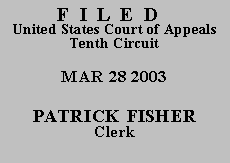

| WILFRED D. MARQUES,
v.
BRIAN BURNETT, Director, Colorado
Department of Corrections; JUANITA
NOVAK, Warden, Colorado Territorial
Correctional Facility; ATTORNEY
GENERAL OF THE STATE OF
COLORADO,
Respondents - Appellees.
|
|
Moreover, we conclude for substantially the same reasons as the district court that Mr. Marques's petition is untimely under 28 U.S.C. § 2244(d)(1). In particular, we note that Mr. Marques's claims arise out of a method of calculating sentencing credits that Colorado officials adopted in July 1990. Accordingly, pursuant to the limitations period established by the Anti-Terrorism and Effective Death Penalty Act (AEDPA), Mr. Marques had until April 24, 1997 (one year after AEDPA's effective date) to file his petition. See 28 U.S.C. § 2244(d)(1)(D) (establishing a one year limitations period for filing petitions for habeas corpus relief and stating that the limitations period begins to run from the latest of several dates, including "the date on which the factual predicate of the claim or claims presented could have been discovered through the exercise of due diligence"); United States v. Hurst, no. 01-7057, 2003 WL 1439621, at **2-3 (10th Cir. Mar 21, 2003) (holding that prisoners whose convictions became final on or before April 24, 1996 must file their habeas corpus petitions on or before April 24, 1997 in order to comport with AEDPA's statute of limitations).
Mr. Marques did not file the instant petition until November 2001, well after the expiration of the limitation period. This one-year period is tolled during the pendency of state post-conviction proceedings. See Fisher v. Gibson, 262 F.3d 1135, 1142-43 (10th Cir. 2001). However, as the district court explained, none of Mr. Marques's many post-conviction motions was pending during the period from April 24, 1996 through April 24, 1997. Moreover, Mr. Marques has not argued that the circumstances warrant equitable tolling of the limitations period, and our review of the record reveals that equitable tolling is not warranted. See Miller v. Marr, 141 F.3d 976, 978 (10th Cir. 1998) (indicating that equitable tolling principles apply only where a prisoner has diligently pursued his federal habeas claims).
Accordingly, for substantially the same reasons as the district court, we conclude that Mr. Marques's § 2241 petition is untimely. We therefore DENY
Mr. Marques's motion for a COA, DENY his motion to proceed IFP, and DISMISS this appeal.
Robert H. Henry
Circuit Judge
*. This order and judgment is not binding precedent, except under the doctrines of res judicata, collateral estoppel, and law of the case. The court generally disfavors the citation of orders and judgments; nevertheless, an order and judgment may be cited under the terms and conditions of 10th Cir. R. 36.3.
1. In his petition to the district court, Mr. Marques cited 28 U.S.C. § 2254. However, as the district court noted, Mr. Marques's petition challenged the execution of his sentence. Therefore, like the district court, we construe Mr. Marques's petition as filed pursuant to 28 U.S.C. § 2241. See Hamm v. Saffle, 300 F.3d 1213, 1216 (10th Cir. 2002).